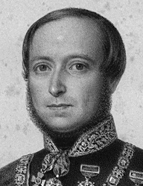

José Silvestre Ribeiro occupies a significant place in the context of Portuguese historiography, although he is now almost forgotten. In addition to a fruitful political and administrative career, in which he combined literary writing with historiographical inquiry, he left an indelible mark on the vast tapestry of the history of national scientific and cultural institutions. The son of António Nunes Ribeiro and Josefa Pereira da Silva, he was awarded a bachelor’s degree in Canon Law by the University of Coimbra.
His liberal convictions quickly became apparent in the university environment, and he joined the ranks of the famous Academic Battalion in support of the liberal cause, but he was forced to leave the University shortly after the Vilafrancada (27 May 1823) and seek refuge in exile. He took part in the Belfastada (June-July 1828), but when this military operation failed, he joined the defeated contingents who took refuge in Galicia, from where he left for Paris. Here he attempted to resume his academic training, attending, among other classes, the lectures of François Guizot (1787-1874) at the Sorbonne, one of the great European historians of his time. These teachings marked his historiographical writing, contributing to his Europeanist conviction regarding Portugal’s historical destiny and making him viscerally critical of the pro-colonial Africanist tendencies then in vogue.
After the arrival of Dom Pedro IV in the Azores, he left for Ponta Delgada, where he joined the expedition led by Admiral George Sartorius (1790-1885), finding himself among the 7,500 brave men who landed in Mindelo on 8 July 1832. During the siege of Porto, he distinguished himself with bravery in the defence of Serra do Pilar, being awarded the Order of the Tower and Sword (1832). In the final stage of the liberal struggles, he joined the expedition led by D. António Severim de Noronha (1792-1860), later 1st Duke of Terceira, leaving Porto and landing in Cacela, in the Algarve. He accompanied the troops to Lisbon and was among the first soldiers to enter the capital on 24 July 1833. After the signing of the Évora-Monte Convention (23 May 1834), he resumed his studies in Coimbra, graduating with a bachelor’s degree (1834), benefiting from the exemptions granted to liberal combatants. Consequently, José Silvestre Ribeiro continued his upward career, serving as general administrator of several districts, Minister of Justice (1857), judge of the Supreme Administrative Court (1875), culminating in his appointment as Peer of the Realm (1882). At the same time, he was a member of parliament for Angra do Heroísmo (1846; 1858-1859) and for Funchal (1848-1851; 1853-1856).
This work is financed by national funds through FCT - Foundation for Science and Technology, I.P, in the scope of the projects UIDB/04311/2020 and UIDP/04311/2020.
